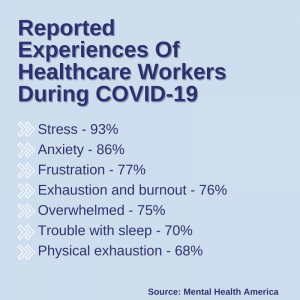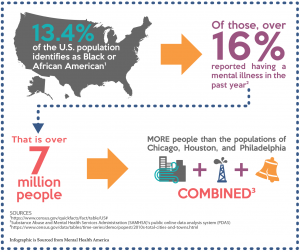Amid the pandemic, the mental health of healthcare professionals has been a great concern. The loss of patients and coworkers accompanied by long and stressful work hours and staffing issues exacerbates physical and mental exhaustion. BIPOC (Black, Indigenous, and People of Color) healthcare professionals are underrepresented and disproportionately affected.
With the complicated state of race relations and the impact of healthcare disparities within their communities (particularly for Black Americans), this places an increased mental health burden on these workers.
Black Americans make up 13% of the country’s population but account for only 10% of nurses and 5% of doctors. To adequately represent the patient population and increase health equity, The National Academy of Medicine’s “The Future of Nursing 2020-2030” report is calling for more diversity in the nursing field. And addressing racial disparities in nursing also means providing support for BIPOC nurses’ mental health and well-being.
In honor of World Mental Health Day (Oct. 10), we’re highlighting the importance of mental health awareness for nurses who identify as Black, Indigenous, or People of Color.
Healthcare workers and mental health
Experiencing nurse burnout? You’re not alone. According to Mental Health America, throughout the COVID-19 pandemic, healthcare workers witnessed increasing numbers of anxiety, depression, loneliness, and other mental health concerns. At the time of the report, 82% experienced emotional exhaustion over the previous three months.

And, 39% of healthcare workers said they did not feel they’ve had adequate emotional support. Nurses were even less likely to report feeling emotionally supported (45%) and more likely to feel more tired compared to other healthcare workers. Black nurses in particular have struggled to find mental health support during the pandemic, as COVID-19 has affected their communities and their own personal health at a disproportionate rate.
Mental health and BIPOC communities
Mental Health America also highlights a staggering percentage of individuals from BIPOC communities that report mental illness:
- Black/African American Community – 17% or 7 million.
- Latin/Hispanic American Community – 15% or 8.9 million
- Asian American/Pacific Islander Community – 13% or 2.2 million
- Native and Indigenous Communities – 23% or 830,000

Interview with a Psych-Mental Health Nurse Practitioner
For more insight, we spoke with Dr. Kameko McGuire, DNP, PMHNP-BC, NP-C, RN—a Florida-based Psych-Mental Health Nurse Practitioner (PMHNP). Dr. McGuire spoke with Aspen to discuss the importance of mental health awareness for BIPOC nurses and other healthcare professionals, addressing stigma, and how to find help and support.
What is your educational and clinical background?
I’m a dual certified doctorate-prepared nurse practitioner, and I’m also board-certified in psychiatric-mental health. My clinical background is in Family Practice and Psychiatry. I work in both inpatient and outpatient settings. I’ve been a family nurse practitioner for 11 years and a PMHNP for seven years.
Why did you choose a PMHNP specialization?
I was a family nurse practitioner first. But then I noticed that I saw several patients with mental health conditions. There were not many psychiatric providers in the area I was living at the time, so I returned to school to be better prepared to care for this patient population. This was by far one of the best decisions I have ever made.
Why is BIPOC mental health awareness so critical?
Mental Health Awareness is just as important as physical health. Taking the time to make sure you are caring for your physical and mental health is vital in maintaining the care of the entire person. Recognizing that mental health is essential in maintaining balance is critical. Being aware can help identify needs early and possibly decrease the severity of the condition by managing it as early as possible when first identified.
BIPOC communities need to recognize that mental health is just as important as physical health.
What are signs that you should seek support related to your mental health?
Some signs to consider seeking help with your mental health include:
- Thoughts of wanting to harm yourself
- Thoughts of wanting to hurt others
- Dysfunction is affecting different aspects of your life, like personal, occupational, or educational
- Prolonged periods of sadness or hopelessness
- You no longer enjoy things you previously enjoyed
- Increased or new use of drugs or alcohol
- Previous treatments are not effective
As a PMHNP, how have you seen racial trauma and triggers impact the BIPOC community, particularly BIPOC healthcare professionals?
The BIPOC community is struggling with fear and anxiety. Fear related to racial tension, safety, and health are just a few reasons. Knowing your triggers and identifying your trauma will help better manage the symptoms associated with both.
As a BIPOC healthcare professional, it is important to identify your safe spaces to feel safe to express your concerns about things going on around you. If you do not have a safe space, seek a safe space, whether friends, family, or mental health professionals.
What are some sources of stigma related to mental health treatment in BIPOC communities?
Stigma related to mental health treatment in the BIPOC is often associated with being seen as weak or crazy. There are often cultural beliefs related to mental health, and this has to be unlearned. BIPOC communities need to recognize that mental health is just as important as physical health. There should be no shame or negativity associated with seeking care for one’s mental health needs.
What are some ways BIPOC healthcare professionals can protect their mental health?
- Seek mental health treatment as needed for yourself. You can’t pour from an empty glass
- Take care of yourself mentally and physically
- Eat well
- Exercise often
- Take your PTO
- Leave work at work, don’t take the stress home
- Do things that make you happy and make you feel whole
- Don’t lose yourself, don’t just identify by relationships, titles, and degrees. What makes you, you?
- Seek to be true to yourself in all situations
What are ways non-BIPOC colleagues can support and be allies to their BIPOC coworkers?
- Take notice of your own biases. If you don’t feel you have any, take a long hard look to make sure that is true.
- Be empathetic and recognize that others’ struggles may not be your own. Do not downplay their concerns because they do not directly affect you.
- Be a safe space, don’t try to fix anything. Just be a listening ear if the person feels comfortable disclosing their concerns to you.
Aspen University offers online RN to BSN, MSN, and DNP programs to help all nurses advance their careers.
 Portia Wofford is an award-winning nurse, writer, and digital marketer. After dedicating her nursing career to creating content and solutions for employers that affected patient outcomes, these days, Portia empowers health practices to increase growth opportunities and become the number one providers in their communities through engaging content that connects and converts. Follow her on Instagram and Twitter for her latest.
Portia Wofford is an award-winning nurse, writer, and digital marketer. After dedicating her nursing career to creating content and solutions for employers that affected patient outcomes, these days, Portia empowers health practices to increase growth opportunities and become the number one providers in their communities through engaging content that connects and converts. Follow her on Instagram and Twitter for her latest.
Some links in this article were updated in October 2024.


